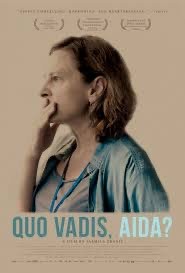Exclusive Premium Content
Quo Vadis,Aida? …An Anti-War Masterpiece Not For The Weakhearted

Quo Vadis, Aida?
Starring Jasna Đuričić as Aida Selmanagić
Written & Directed by Jasmila Žbanić
Rating: *****
This harrowing masterpiece, shot with the vividness of a flying bullet, hits home reminding us of the ravages of war during times when countries perpetrating war extol their soldiers as messiahs saving the border from enemies. Often times, the soldier are nothing but messengers of death as they enter into hostile territory and kill civilians.
This is what happened in on 11 July 1995 in the small idyllic town of Srebrenica where the Bosnian Serb army entered and killed thousands of men and boys. Oh, they spared the women and children…so kind of them. History has not forgotten their kindness. The screams of protest as husbands were torn away from wives, sons from their mothers and taken away to be butchered will ring in your ears for as long as man plunders for land. This is a film like no other.Its description of political violence is exceptional.
This stunningly vivid unforgettable anti-war drama is a shrieking war cry. It takes us into a UN camp in Srebenica where thousands of refugees are in hiding from the invasion thinking they safe. Minute by minute , brick by brick writer-director Jasmila Žbanić builds the dramatic tension inside the camp as safety becomes a retreating myth, and death an impending reality.
The film is so vivid and palpable it feels as though we are transported back in time. To have an actress as brilliantly unobtrusive as Jasna Đuričić play the protagonist, a UN translator named Aida Selmanagic , is a masterstroke. I have never seen Ms Đuričić before. Now I will seek out this Serbian wonder woman’s other films.
By pursuing one astute gutsy woman’s turbulent emotions at a point in time in history when death is the inevitable reality, we are thrown right in the middle of a brutal conflict where civilian lives cease to matter.A blurred myopic moral compass runs through the film’s narrative. By the time Aida is reduced to bargaining for her husband and two sons’ lives with the officers in-charge we feel her terror and sinking hope as though we are there with her.
At one point she tells the officers she can shoot her sons in their legs so they can be sneaked away in a hospital.“Spare at least one of my sons,” she bleats like a sacrificial lamb. Aida lives. Her family is butchered. They were all men, unfortunately.
My favourite scene in this indescribably searing masterpiece is the one where Aida, months after the war returns to her apartment which is now taken over by another woman.As she looks around at what not so long was her family abode, sounds and visual of her earlier life come back to haunt her.
I have no shame in admitting I wept through much of this film.As should all of civilization which thinks war is heroic .This is a film that wil be talked for many years to come.The editing(Jarosław Kamiński), the cinematography(Christine A. Maier) , the tightly-wound narrative structure and every actor playing every civilian and officer on that doomed camp is wedged in my head. I want to revisit the film to absorb more of its majestic musk of mortality. But I can’t. I am too frightened.










